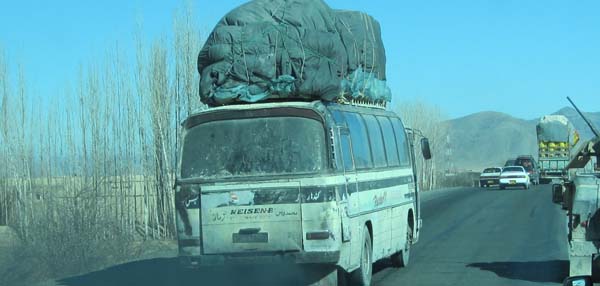A number of Afghan refugees returned from Iran with ardent desire to breathe a sigh of relief in their own country. They dreamt of alleviating the burden of nomadic life beside their family members. Afghans’ nascent democracy seemed to them a panacea for all challenges. The ferment of election in 2014 may have compounded their sense of patriotism. The ostensible discourse of liberty, human rights, reconciliation, etc. was cogent enough for them to return their homes. To their unmitigated chagrin, their dream did not come true and their burning hopes were crumbled on the way to their domiciles.
Reports say that masked gunmen abducted 30 Afghan men, Hazaras, who were travelling by bus through southern Afghanistan after returning from Iran – on Monday evening on Herat-Kabul highway. Nasir Ahmad, an official with the Ghazni Paima bus company, is quoted as, “Our driver saw a group of masked men in Afghan army uniform signaling him and he thought they were soldiers so he stopped …. The gunmen took 30 Hazaras away with them.” Moreover, a female passenger is quoted as saying, “They were standing on the highway with their faces covered …. They only took Hazaras, including my cousins. After they took the people, the police arrived but they refused to go after the kidnappers, saying they needed orders from Kabul.”
The district governor blamed the militant group, though the police commander of Zabul province said the district borders Pakistan and that there is a good chance that the gunmen were from that country and took their victims back across the border.
Although no group, including the Taliban insurgents, has claimed the responsibility for abduction but a feeling of fear has permeated Afghans recently that the influence of the Islamic State (IS) group, which has a strongly anti-Shiite agenda, could be growing in Afghanistan. As a result, local officials reported the burnings of a shrine and several homes in Charkh district of Logar province, on Monday, by a group said to be affiliated to Islamic State, which is largely based in areas of Iraq and Syria.
Compared with Iraq and Pakistan, sectarianism historically has not been as serious an issue in Afghanistan. Even the Taliban militants have taken a much less sectarian stance in recent years.
After all, the militants have sought, sporadically, to foment sectarianism between Shiite and Sunni Muslims. In other words, they muddy the water to make use of the opportunity in their own political interests. Their appetite for turbulence and terror originate in their fundamental ideology.
Despite their infamy – especially after running a 5-year-brutal-regime in Afghanistan – the Taliban ragtag militants yet persevere to keep their cruelty under the veneer of social decorum. For instance, they balk at the idea of killing non-combatants, who are not affiliated with government, or abducting them under no suspicion. Moreover, they feel disdain for mugging the travelers on the way to their destination.
Hence, this anomaly could have happened only by hardliners – who may have link whether with Islamic State or al-Qaeda.
During the Taliban regime, sectarian violence reached its peak. The Shiite minority suffered heavy casualties as a result of Taliban’s fundamental ideology and puissant sense of ethnocentrism. They imposed their warped beliefs on the barrel of gun – as the ISIS do across the Middle East. Their totalitarianism and egotism, which rooted in their spurious faith, resulted in a whole can of worms. The voices, raised for rights or freedom, were repressed. Women lost their spouses and children were orphaned, mostly for having a certain type of beliefs, and many families were left without bread-bringer. Such cruelties are known internationally and the history keeps bleeding with the painful wounds.
However, after the downfall of the Taliban’s regime, the inchoate democracy seemed a panacea for the problems and Afghans hoped and prayed for the best. The strident discourse for human rights, freedom, etc. resounded across the country and people exulted over the fall of those who threatened their lives and liberties. To put in succinct, the eyes of Afghan citizens were flashing with hope and exultation.
Ill-fatedly, this hope did not last long and Afghans suffered casualties by roadside bombs, suicide attacks, etc. carried out by the militants. This fear loomed large with each passing day and today has changed into a highly worrisome issue. The attempts of Karzai’s government, within the last decade, to establish peace were proved abortive. Karzai left no stone unturned to bring Taliban into the table of negotiation. He knocked on every door, condoned the militants’ violent behaviors via releasing them from Bagram prison and travelled to Pakistan 21 times but none gave the desired fruit. Karzai’s flexible attitude on the face of Taliban’s adamant animosity was really surprising.
The national and international counterterrorism strategies could not alleviate the problems and failed to establish peace across the country. Now, the peace platitude has come to light once more and the Unity Government tries its chance. It is too early to judge whether the struggle of the new government come to fruition.
What Afghan citizens want is the eradication of sectarianism and terrorism and institutionalization of equal rights, irrespective of color, race, sex or belief, on the basis of a democratic government. Prayerfully, the new government will take an effective strategy to end the bedlam of insecurity and cultivate a sense of brotherhood among all citizens.

